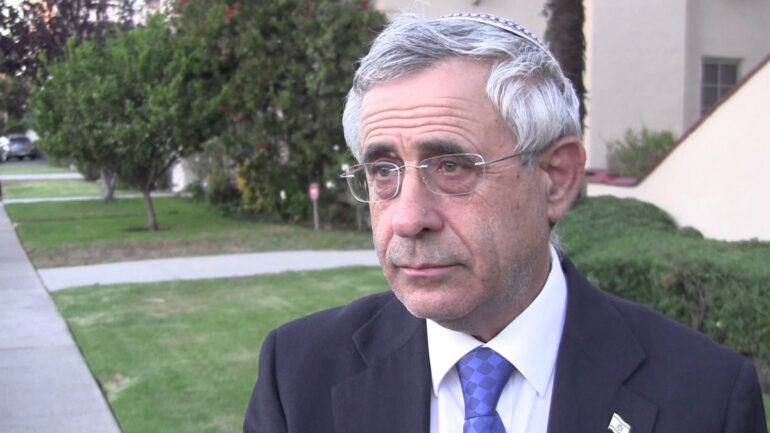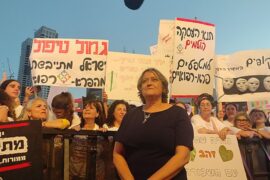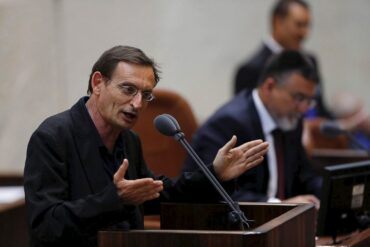A well known Israeli academic made headlines Tuesday night when he declared at a Petaḥ Tikva demonstration in support of Prime Minister Binyamin Netanyahu (Likud) that former Prime Minister Yitzḥak Rabin (Labor) was not actually assassinated by Yigal Amir.
Despite Amir’s conviction for killing Rabin on November 4, 1995, Professor Mordekhai Kedar – a scholar of Arabic culture at Bar-Ilan University – asserted that the assassination was actually orchestrated by a senior political figure trying to stop Rabin from pulling Israel out of the controversial Oslo Accords.
Member of Knesset Moshe Yaalon (Blue & White), who served as Israel’s head of military intelligence under Rabin, wrote in his book Derekh Arukha K’tzafra that the prime minister had been planning to cancel Oslo due to evidence that Palestinian Liberation Organization (PLO) Chairman Yasser Arafat was plotting to exploit the vulnerabilities resulting from Israeli concessions.
United States President Bill Clinton was heavily invested in the Oslo process and, according to conspiracy theories that arose in the wake of the assassination, had conspired with Foreign Minister Shimon Peres (Labor) to eliminate Rabin in order to save the accords.
Kedar, who spoke at the rally only a few days before the 24th anniversary of Rabin’s assassination on the Gregorian calendar, claimed that an unnamed senior political leader had planned the murder and that the truth surrounding the assassination continues to be covered up.
“And how do I know it’s been silenced?” he asked the audience. “For 25 years I was in the intelligence corps. I’ve seen tens of thousands of documents that are confidential. Why confidential? Ladies and gentlemen, much of the investigation into Rabin’s murder are still in secret documents to date.”
Kedar then presented a document to the demonstration, declaring that “This is one of them, which came to my hands in a wonderfully legal way.”
The lecturer then went on to tell the astonished crowd that “The person who murdered Rabin was a man whose initials are yud resh, but not Yitzhak Rabin.”
“The person behind this is probably a leading politician, who wanted to eliminate Rabin because he wanted to get out of the Oslo Accords.”
“Why is he sitting in solitary confinement?” Kedar asked rhetorically about Yigal Amir.
“So that he won’t tell people the truth!”
Kedar concluded his bombshell remarks by calling for a “real investigation” into the assassination.
Prime Minister Netanyahu’s office responded to Kedar’s speech, saying that “Prime Minister Netanyahu condemns the nonsensical remarks in relation to Yigal Amir, the murderer of Yitzhak Rabin.”
Condemnation of Kedar’s statements also came from politicians across Israel’s political spectrum and from
Bar-Ilan University immediately distanced itself from Kedar, issuing a statement that it “completely condemns” his remarks and that his opinions “do not represent the university and its employees. We maintain that there is no place for such remarks in Israeli society.”
Kedar has been suspended from representing Bar-Ilan abroad and the administration has summoned him to a disciplinary hearing over his remarks.
Kedar nevertheless told Channel 12 on Wednesday that he stands by his statements from the night before and that he would rather resign than recant what he said at the rally.
Thousands of people, including hundreds of Bar-Ilan students, have meanwhile signed a petition supporting Kedar, calling the university’s actions an attack on free speech.
The petition, entitled “Citizens of Israel Support Dr. Mordekhai Kedar, the State of Israel’s Information Fighter,” was initiated by Bar-Ilan students and stated that “Dr. Kedar constantly devotes his time and energy to defending the State of Israel, fighting falsehood, incitement, and propaganda against the State and its citizens, all in his own time, with his whole heart and a genuine sense of mission for the people of Israel.”
The petition further argued that the university’s treatment of Kedar is tainted with political discrimination and concluded that “it is permissible to criticize Dr. Kedar as he criticizes others. It is fair to say that his words are in error or that they are unworthy. That is why the State of Israel is a free state with freedom of opinion and expression. But from here to the serious injury to his name and livelihood, and his silencing by summonses to disciplinary committees, is going a long way.”
Professor Kedar’s statements obviously struck a deep nerve. The media storm, harsh condemnation from political figures across the spectrum and sanctions from his university all indicate that Israeli society still hasn’t fully healed from the assassination of a national leader.
But the reactions to Kedar’s claims might also indicate that many powerful people have something to hide, in which case reinvestigating the murder and publicizing the relevant classified documents might actually be the best way to actually heal Israeli society.
Despite the fact that he’s never shied away from expressing controversial positions, Kedar is a respected academic who can’t be dismissed as a crackpot conspiracy theorist. The claims he’s making about the Rabin assassination could be nonsense but they could also be true. The only way to find out for sure would be an unbiased and transparent public investigation with full access to classified material that leaves no rock unturned.
At this point in Israel’s history, such a reinvestigation could heal much more than it harms. The only people with anything to lose from a new inquiry would be those guilty of complicity in either the murder or in the cover up Kedar claims took place in its aftermath.





